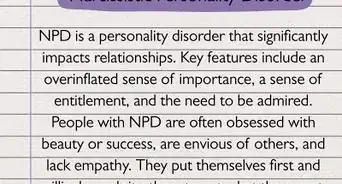This article was co-authored by Liana Georgoulis, PsyD. Dr. Liana Georgoulis is a Licensed Clinical Psychologist with over 10 years of experience, and is now the Clinical Director at Coast Psychological Services in Los Angeles, California. She received her Doctor of Psychology from Pepperdine University in 2009. Her practice provides cognitive behavioral therapy and other evidence-based therapies for adolescents, adults, and couples.
There are 7 references cited in this article, which can be found at the bottom of the page.
wikiHow marks an article as reader-approved once it receives enough positive feedback. This article received 39 testimonials and 90% of readers who voted found it helpful, earning it our reader-approved status.
This article has been viewed 851,652 times.
Narcissists can be difficult people to deal with. Their minds are limited in a way that prevents them from truly looking outside themselves, and their worlds are limited entirely to the internal while excluding the external. There are many forms of narcissism, and dealing with a narcissist can be both frustrating and potentially dangerous to your own mental and emotional health. However, there are a few basic practices that you can implement when dealing with just about any narcissist.
Steps
Dealing with a Narcissist Long-Term
-
1Learn to identify a narcissist. Before you start tossing the word around, you need to remember that a lot of people have some narcissistic tendencies but aren't necessarily narcissists. By learning what makes a narcissist, you'll be able to better avoid them and deal with the ones already in your life. Ask yourself if the person:[1]
- Has an exaggerated sense of their own importance.
- Expects or demands constant praise and attention from others.
- Has little regard for the needs or feelings of others.
- Acts arrogant or superior to other people.
- Believes that they are in some way special, and that only other people who are special can truly understand them.[2]
- Believes that others are envious of them.
- Takes advantage of others to get what they want.
- Is obsessed with attaining great power, success, or ideal love.
-
2Figure out your own needs. If you are in need of someone who can provide mutual support and understanding, it is best to limit the time you spend with the narcissist in favor of others who can provide you with more of what you need. On the other hand, if the narcissist in your life is interesting or vibrant in other ways, and you do not need additional support, the friendship or relationship may work for the time being.
- Make sure that you're not harming yourself by staying in contact with the narcissist. This is especially true if you have a close relationship with them (such as that of spouse or parent), because they will take up more of your time.
- If you find yourself exhausted by their neediness (they need constant validation, praise, attention, and unwavering patience), then you need to rethink your relationship with them.
- If a narcissist in your life is abusing you (manipulating you, constantly talking down to you, or treating you as if you have no value), you need to get out immediately, because they are dangerous for your health.
Advertisement -
3Accept their limitations. If this person is truly important to you, you will need to accept their narcissism. Stop asking or demanding support or attention from the narcissist that they are unable to provide. Doing so will accomplish nothing but making you feel more frustrated and disappointed, which will only damage the relationship more.
- For example, if you know that your friend Bob is a narcissist, don't keep trying to bring up your own troubles with him. He simply will not be able to empathize, and will quickly turn the conversation back to himself.
-
4Define your own self-worth by other means. Ideally, self-worth is built from the inside rather than being dependent on outside support. For many, however, self-worth grows stronger when others affirm their existence by valuing them as individuals. Do not go to a narcissist when looking for this type of support, though, since a narcissist will not be able to provide it.[3]
- Understand that if you confide in that person, they will be unable to truly value the weight of what you've shared. They may, in fact, use this knowledge as means to manipulate you, so be careful what you tell a narcissist.
- Remember that the narcissist's motto is "Me first." When dealing with them, you will have to operate under their motto.
-
5Try to have compassion. This might be easier said than done, but remember: in spite of all the supposed self-confidence the narcissist displays, deep down, there is a severe lack of true confidence that requires the constant approval of others to subdue. Moreover, the narcissist does not have a full life because they shut down a wide range of emotion.[4]
- This doesn't mean letting them do whatever they want with you. It means that you remember that the narcissist is a human being who can't connect with other people. This often happens as a result of narcissistic parents.
- Also remember that narcissists have no understanding of unconditional love. Everything they do is self-serving, which is a terribly lonely way to live.
- It may help you to have compassion if you can remember that these negative behaviors are projections of their own self-hatred and feelings of inadequacy.
Dealing with a Narcissist in the Short-Term
-
1Avoid the mind games. A lot of narcissists play mind games that force you to constantly be on the defensive. The best way to deal with these games is to recognize the game and to stop playing. To deal with a narcissist, you have to keep your ego out of the running.
- Get out of playing the "blame game." A narcissist cannot do any wrong in their own mind, which means they need someone to blame for any failures. Instead of trying to argue or explain how it's their fault, you have to set boundaries. Keep track of what they've been doing, so you can say (in a non-accusatory tone), "Hey Dan, here's the inventory count which shows we do need more paper."
- Narcissists tend to be really good liars. If you remember something very differently from them (especially if it puts them in a bad light) don't start doubting yourself. Don't try to argue it, however, unless you have absolute empirical evidence that you're right. Even then, a narcissist will manage to turn the whole thing around to reflect well on them.
- The most important thing to remember is to cultivate a non-responsive attitude towards them. If you have a narcissist in your life, there will be jabs, put-downs, and lies. Don't respond. It's like a game of catch, only you don't need to catch the ball and throw it back. In fact, let the ball (the insults, mind games, etc.) sail right on past.
-
2Do not expect to please a narcissist. Since narcissists have large egos and think overly well of themselves, they will likely see you as someone who is, in some ways, inferior. You might be able to win the narcissist's favor on a short-term basis, but you should never expect to be able to satisfy or impress a narcissist in the long-term.[5]
- Be prepared to fall short in their estimation, often. You will never be able to live up to what they expect you to be, which is someone who devotes complete attention to them.
- Try not to take their criticism to heart. Remind yourself that it comes from a very off-balanced worldview. Likewise, don't try to argue your merits with the narcissist, because they will be unable to hear you.
- If they're constantly belittling you (whether they’re a spouse, a parent, or a boss), find someone you trust to talk over what they say (a trusted friend, a counselor, etc.). If you can, get some space from the narcissist for recovery purposes.
-
3Listen a lot. If you have to engage with the narcissist, the best way to deal is to simply listen. The narcissist will demand your attention and your ear, and will likely get angry or cold with you if you neglect to provide it. Everything has limits, of course, and if the narcissist in your life is demanding your attention at a time you cannot provide it, you should not cave in. If you plan on being in a friendship or other relationship with a narcissist, however, you should be prepared to do a great deal of genuine listening.
- If you find your mind straying, ask them for clarification on an earlier point that you remember, so that you find your way back into the conversation. For example, you might say "I was thinking about what you said about X and didn't hear what you just said. Could you repeat that?"
-
4Be as genuine in your praise as possible. In all likelihood, there is some quality about the narcissist in your life that you admire. Build the majority of your praise around that quality. It will seem more sincere, which will keep you in the narcissist's good graces, and it will also be a constant reminder to yourself about why you keep this person in your life.
- For example, if your narcissist is a really good writer, make sure that you tell them that. Say things like "You're really articulate. I love the way you manage to get your ideas across so clearly." They'll recognize your honesty and they'll be less likely to try to attack you.
- Even if you offer the narcissist the compliments and praise they crave, they are still likely to try to find ways to undercut and control you, due to their deep insecurities. Their methods can be very subtle and sophisticated, so be on-guard.
-
5Smile and nod. If the narcissist in your life is someone you cannot choose to avoid contact with, and you find yourself unable to tolerate flattering that person as often as is necessary, the next best option is to keep quiet. You will not gain any favor with the narcissist by keeping your mouth shut, but by not disagreeing with that person, you passively give the impression of agreement.
- Since a narcissist demands constant attention, smiling and nodding is a good way to give that to them without having to commit yourself to further interaction. This method works particularly well for those narcissists who aren't inextricably intertwined in your life (like a coworker, a family member you don’t live with, or a friend you aren't super close to).
-
6Persuade the narcissist that what you want benefits them. If you need something from a narcissist, the best way to get it is to frame the request in a way that suggests to the narcissist that there will be some benefit to them in providing it.
- For example, if you want to persuade your friend to go to a new restaurant with you, and her narcissism revolves around her social standing, say something along the lines of, "I hear it's the best place to go if you want to rub elbows with all the influential people in the community."
- As another example, if you want to see an exhibit with a friend, and his narcissism revolves around his intelligence, you could say something like, "They say it's especially intriguing for clever people with quick minds."
-
7Present constructive criticism in positive or neutral terms. The narcissist will never accept blatant criticism. He or she will probably assume that you are either jealous or simply ornery, and will devalue your opinion even more as a result. Avoid inflicting humiliation, even though it might be tempting to do so. Frame things in a way that invites the narcissist to believe that he or she still has the upper-hand.[6]
- For instance, if you need to remind a narcissistic client to pay you, gently remind them by asking them for a reminder of the agreed-upon pay period rather than directly stating that the payment is late.
Staging an Intervention
-
1Determine if an intervention is appropriate. Sometimes, especially when the narcissist is someone you love (a significant other, a parent, or a child), you may want to consider staging an intervention. This can be very difficult, as it can be very hard to convince a narcissistic person that they have a problem.
- The best time to stage an intervention is after something very life-changing has happened to the narcissist (like an illness, a job loss, etc.) where the things that are feeding their ego are damaged or removed.
-
2Get the help of a professional. You'll need a neutral and experienced party, as things can get emotional and stormy during the intervention. They can also help you plan the intervention and give you some idea of how the intervention might go. Try to get the advice of someone such as a behavioral therapist, psychologist, or licensed clinical social worker who has experience dealing with narcissists.
- A professional can discuss different therapeutic options with you. Individual psychotherapy and group therapy both have their benefits and have been shown to help narcissistic individuals see other people as individuals who are as important as they are.[7]
- Look around in your area and ask some people whose opinions you trust who they might recommend. You want to make sure that you have the right person for the task.
-
3Recruit about 4 or 5 people. These need to be people who are close to the narcissist in some way, or people who have been hurt by the narcissist but are willing to see them get the help they need.
- Make sure that these people aren't going to warn the narcissist ahead of time and aren't going to spread gossip around about what is going on.
-
4Plan the intervention. An intervention is not a spur of the moment thing. You'll need to plan out where and when and what you all are going to say and do. The professional can help you here with some of what you might expect from the intervention.
-
5Develop a couple talking points. These are the main points that you want to stick to during the intervention. They can be things like how the narcissist's issues are hurting the family (give specific examples) and why you're having the intervention (they've become abusive, or they have stopped contributing to the family; again, you want to be specific).
- You need to have some sort of consequence for their actions if they refuse the intervention. This could be anything from not participating in activities that are important to the narcissist to ending the relationship. This will give you leverage in your effort to convince them to change.
-
6Make it clear how the narcissist is hurting themselves. It's important that you use your compassion during the intervention, since the reason you're doing it is so that they have a chance to get better. Let the narcissist know that making a change will be for their benefit as well as everyone else’s.
- Use "I" statements. This kind of language is less likely to put the narcissist on the defensive. For example, "I feel ignored when you constantly turn the conversation to yourself," or "I feel that you expect me to constantly be emotionally available without providing me with emotional support in return." Again, use specific examples of the times that they hurt you.
-
7Be prepared for the possibility that the intervention won’t work. Remember that if you do stage an intervention, it doesn't mean that the narcissist will actually do what they need to do to get better. Likewise, therapy for narcissists does not always work, so be prepared for any outcome on that score.
Expert Q&A
Did you know you can get expert answers for this article?
Unlock expert answers by supporting wikiHow
-
QuestionCan a narcissist fall in love?
 Klare Heston, LCSWKlare Heston is a Licensed Independent Clinical Social Worker based in Cleveland, Ohio. With experience in academic counseling and clinical supervision, Klare received her Master of Social Work from the Virginia Commonwealth University in 1983. She also holds a 2-Year Post-Graduate Certificate from the Gestalt Institute of Cleveland, as well as certification in Family Therapy, Supervision, Mediation, and Trauma Recovery and Treatment (EMDR).
Klare Heston, LCSWKlare Heston is a Licensed Independent Clinical Social Worker based in Cleveland, Ohio. With experience in academic counseling and clinical supervision, Klare received her Master of Social Work from the Virginia Commonwealth University in 1983. She also holds a 2-Year Post-Graduate Certificate from the Gestalt Institute of Cleveland, as well as certification in Family Therapy, Supervision, Mediation, and Trauma Recovery and Treatment (EMDR).
Licensed Social Worker
-
QuestionCan narcissism be cured?
 Klare Heston, LCSWKlare Heston is a Licensed Independent Clinical Social Worker based in Cleveland, Ohio. With experience in academic counseling and clinical supervision, Klare received her Master of Social Work from the Virginia Commonwealth University in 1983. She also holds a 2-Year Post-Graduate Certificate from the Gestalt Institute of Cleveland, as well as certification in Family Therapy, Supervision, Mediation, and Trauma Recovery and Treatment (EMDR).
Klare Heston, LCSWKlare Heston is a Licensed Independent Clinical Social Worker based in Cleveland, Ohio. With experience in academic counseling and clinical supervision, Klare received her Master of Social Work from the Virginia Commonwealth University in 1983. She also holds a 2-Year Post-Graduate Certificate from the Gestalt Institute of Cleveland, as well as certification in Family Therapy, Supervision, Mediation, and Trauma Recovery and Treatment (EMDR).
Licensed Social Worker The edges around a narcissist can be softened. Group therapy might be the most effective. However, couples therapy might also be useful because the objectivity of the therapist may cut through some of the narcissism. If a person is willing to work through their childhood issues, good progress can be achieved.
The edges around a narcissist can be softened. Group therapy might be the most effective. However, couples therapy might also be useful because the objectivity of the therapist may cut through some of the narcissism. If a person is willing to work through their childhood issues, good progress can be achieved. -
QuestionHow do you control a narcissist?
 Klare Heston, LCSWKlare Heston is a Licensed Independent Clinical Social Worker based in Cleveland, Ohio. With experience in academic counseling and clinical supervision, Klare received her Master of Social Work from the Virginia Commonwealth University in 1983. She also holds a 2-Year Post-Graduate Certificate from the Gestalt Institute of Cleveland, as well as certification in Family Therapy, Supervision, Mediation, and Trauma Recovery and Treatment (EMDR).
Klare Heston, LCSWKlare Heston is a Licensed Independent Clinical Social Worker based in Cleveland, Ohio. With experience in academic counseling and clinical supervision, Klare received her Master of Social Work from the Virginia Commonwealth University in 1983. She also holds a 2-Year Post-Graduate Certificate from the Gestalt Institute of Cleveland, as well as certification in Family Therapy, Supervision, Mediation, and Trauma Recovery and Treatment (EMDR).
Licensed Social Worker
Warnings
- Minimize your time with the narcissist as much as you can, and cut ties completely if you have to. If you spend too much time with a narcissist, you risk becoming interdependent with them to the point where it negatively impacts your own emotional health and development.⧼thumbs_response⧽
- It is really important to be aware of your own mental health when dealing with a narcissist. If your quality of life is diminishing because of them, you need to get away, even if they're a parent, a spouse, or a boss.⧼thumbs_response⧽
References
- ↑ https://www.psychologytoday.com/us/blog/fulfillment-any-age/201802/the-ultimate-guide-identifying-narcissist
- ↑ Liana Georgoulis, PsyD. Licensed Psychologist. Expert Interview. 6 September 2018.
- ↑ https://opentextbc.ca/socialpsychology/chapter/the-feeling-self-self-esteem/
- ↑ https://lesley.edu/article/the-psychology-of-emotional-and-cognitive-empathy
- ↑ https://www.helpguide.org/articles/mental-disorders/narcissistic-personality-disorder.htm/
- ↑ https://www.psychologytoday.com/us/blog/evolution-the-self/201110/the-narcissists-dilemma-they-can-dish-it-out
- ↑ http://psychcentral.com/disorders/sx36t.htm
About This Article
To deal with a narcissist, try to avoid their mind games and set boundaries so they can't blame you for things that aren't your fault. Narcissists are critical of others, so don't take their criticism to heart or let it define you. It's best to avoid arguing with them or trying to get them to see your point of view, since they're incapable of this. If you need something from them, the best way to get it is to frame the request in a way that suggests they will benefit from providing it. For tips on staging an intervention with a narcissist, read on!



















































































Medical Disclaimer
The content of this article is not intended to be a substitute for professional medical advice, examination, diagnosis, or treatment. You should always contact your doctor or other qualified healthcare professional before starting, changing, or stopping any kind of health treatment.
Read More...